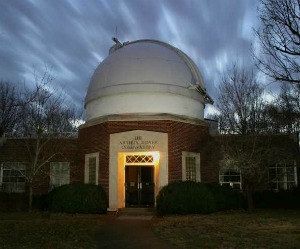
The Vanderbilt Dyer Observatory’s new continuing education series, Astronomy for Adults, is now accepting registrations.
The series will cover a wide range of astronomy topics and each course will include a mix of discussions, experiments using observatory equipment and observations through the Seyfert Telescope. The series will be taught by Dyer Observatory’s resident astronomer, Billy Teets.
Courses will take place from 6 to 10 p.m. on the first Tuesday of the month, beginning March 5 and running through Nov. 5. Please note that class will not be held in May or July. The cost for each session is $150. A box supper is included. Each course stands alone, so attendees may tailor the series to their interests and schedule. To register, please email Lynn McDonald.
March 5 – Cliff’s Notes for the Universe
This session will provide an overview of the kinds of objects and phenomena that have been observed in the universe, including solar system planets, nebulae, star clusters, types of galaxies and “exotic objects.” The group will break to observe some of the object types in the Dyer Observatory Seyfert Telescope.
April 2 – Taking a Measure of Things
This course explores the techniques used to measure the size, weight and distance of objects through the use of hands-on demos, computer software, and even some observations using Dyer Observatory telescopes. The night will end with a viewing various objects through the Seyfert Telescope.
June 4 – The Lives of Stars
In this course, several hands-on demonstrations will help illustrate the physical components of stars. Using naked-eye observations, visual telescopic observation and telescopic imaging, participants will view objects associated with the theme of the night including star-forming regions, stars at various stages in their lives, stellar systems and stellar remnants.
Aug. 6 – Illuminating our Understanding of the Universe
This course covers the entire electromagnetic spectrum, not just visible light, and how light is used to determine things about celestial objects. The evening will conclude with a viewing through the Seyfert Telescope.
Sept. 3 – Astronomy that Everyone Should Know
There are some basic aspects of astronomy that every single person should know and understand. This course will cover everyday motions of the sky, eclipses and moon phases, where the sun and moon are at any given time and why, how to use the heavens to tell time and more. There won’t be much complicated math—just some hands-on activities. The evening will end with a viewing through the Seyfert Telescope.
Oct. 1 – “That Thing is How Far?!”
Probably the most common question at Dyer Observatory is “How far is that from us?” It is a really good question, and it is usually the first thing that astronomers ask when studying an object. This course will use hands-on demos and computer software to simulate distance-finding techniques of astronomy. The evening will end with a viewing through the Seyfert Telescope.
Nov. 5 – “The Tools of the Astronomical Trade”
This course focuses on telescopes and other associated technologies, beginning with a review of the history of the telescope from the early 1600s to present day. The class will also learn about other technologies that, in combination with the telescope, have enabled a more thorough exploration of the universe, such as spectrometers, CCD detectors and adaptive optics systems. The evening will end with a viewing through the Seyfert Telescope and imaging with other Dyer telescopes.
Dyer Observatory is located at 1000 Oman Drive in Brentwood.
To register, please email Lynn McDonald.